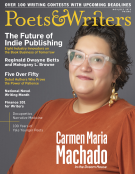This year marks the centennial of the Yale Series of Younger Poets, the oldest annual literary award in the United States. The prize, which offers publication of a debut collection by Yale University Press, has heralded the arrival of luminaries such as John Ashbery, Robert Hass, and Adrienne Rich, and launched the careers of many more. The award was initially open only to poets under the age of forty—hence the name—but in 2015 the age requirement was lifted. To celebrate the century mark, in October Yale University Press released Firsts: 100 Years of Yale Younger Poets edited by Carl Phillips, who has served as the prize judge since 2010, succeeding Louise Glück. A professor of English at Washington University in St. Louis and the author of numerous poetry collections, including Pale Colors in a Tall Field, forthcoming from Farrar, Straus and Giroux next year, Phillips recently spoke about curating the anthology, the evolution of the prize, and his experience as a judge. (The 2020 prize is open for submissions until November 15.)

Carl Phillips (Credit: Mark Katzman)
How has the prize evolved since 1919?
It has become much more inclusive, not just in terms of subject matter, but also in terms of diversity, race in particular. In this sense the prize has evolved side by side with the landscape of American poetry itself. This is also true when it comes to poetic styles and strategies, which have moved from being very conservative to increasingly more innovative.
Have you noticed any discernible changes among the submissions since you began your tenure as judge?
There is no doubt that there has been more racial diversity. I’m convinced this has more than a little to do with my being the first person of color to serve as judge. This also has to do with the screeners. I’m only the second judge to have poet screeners at all, and I made a point of selecting a diverse group; they are African American, Native American, Asian American, white, queer, straight, male, female, and gender-fluid. Another clear shift has occurred as a result of removing the age limit for entrants. We’ve since had two winners over forty—so that’s a welcome strike against ageism.
What were some of the challenges of putting together an anthology spanning 1919 to 2018?
One was how to represent everyone fairly. In the earlier iteration of this anthology, some poets were represented by more poems than others—this made sense, since not all poets are equally good; but who’s to say what’s “good”? So I decided to include three poems by each poet. The other challenge was that I knew people would be expecting to see certain well-known poems by certain poets—Rich and Ashbery, for example. But I decided to take advantage of being the sole editor and simply pick the poems I liked the most—hardly a shocking thing to do, but it does mean accepting that not every reader will be happy.
What greater role do you see the series playing in the world of poetry?
Because it is one of the oldest prizes in this country, it is at least one useful map of how American poetry has evolved over time. Other than that, I think the main role is what it’s always been, to bring to light a new voice—something that plenty of other prizes also do, of course, but again, because of the long history of the prize, it brings a certain gravitas that is unique.
What has most surprised you in your years serving as judge?
I’ve been surprised at how the majority of the manuscripts I see resist giving any kind of offense—they’re well-behaved, polite, in terms of content and style. But I don’t go to poetry for good manners. I want to be shaken out of my usual assumptions about what poems can do, what they can say, how they can say it. I can usually tell I’m getting close to a winning manuscript when I find myself asking aloud, “What the hell is going on here?” That doesn’t mean anything radical has to be happening. There can be risk and wilderness in clarity of thought and expression. A strange sensibility that can’t help its own strangeness—that’s what I’m after.
You mention the growing diversity of voices represented in poetry and its connection to the cultural conversations of the moment. In Firsts, you cite the establishment of Cave Canem in 1996 as a pivotal moment. What do you see as the current challenges and future goals prizes should be striving for to ensure a rich and inclusive landscape of voices?
Part of the answer is right there in your question: The long-term goal should be to ensure a rich and inclusive landscape of voices. That means the more immediate goal is to have an array of winners who reflect the range of voices out there. And that means doing whatever you can to ensure that you will get submissions from across that range of voices. I don’t believe it’s a coincidence that the greatest amount of diversity has occurred under a judge who is openly queer and of color. The announcement of my appointment was a real confidence builder for a lot of younger poets of color in particular—or so I’ve been told. It’s pretty much like anything, but I’ll use literary journals as an example. If you want to show that you’re committed to diversity, you better have a masthead that shows diversity—not only will it confirm your commitment, but it’s going to encourage diverse submissions.
What do you see as the ultimate role of prizes and accolades in poetry? Do you see them as working alongside or as separate from poetic practice?
The only real role I can think of is to showcase work and thereby make potential readers more aware of it—which in turn can then broaden the conversation that poems ideally provoke and engage in. An effect of prizes—but I wouldn’t call this any part of their role—is to, usually very briefly, give a boost to the poet, in terms of morale. We’re all pretty insecure, and we all want to be loved, and a prize or accolade feels like confirmation that we did well. But then there’s the next day and the reality of the blank page.
Maya C. Popa is the author of American Faith (Sarabande, November 2019). She is the poetry reviews editor at Publishers Weekly and the director of creative writing at the Nightingale-Bramford School.









